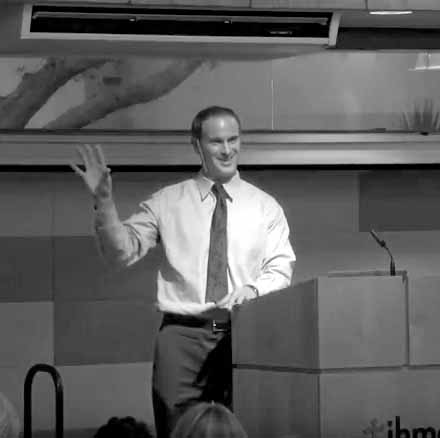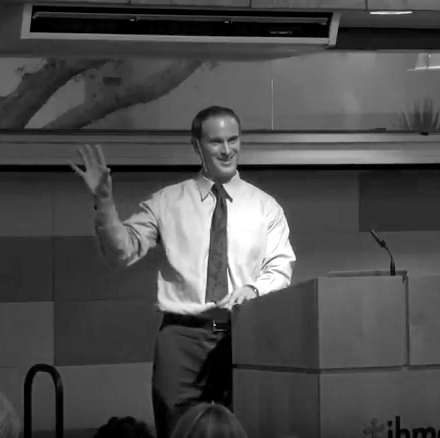How to Quiet Your Mind: 10 Helpful Strategies to Get You Started
Written by Stephen Anton PhD on June, 1st 2021

Learning how to quiet your mind can have a big impact in your life. When your mind-body is calm and serene, it functions optimally.
Unfortunately, very few of us experience the benefits of a quiet mind in today’s day and age. We are all constantly bombarded with incoming messages, news flashes, social media updates, etc, which serve to keep our mind agitated and distracted.
And when the mind is not distracted by these messages, it tends to constantly “talk” and “make noise” even if no sound occurs. For most people, the mind is constantly chattering and replaying fears and doubt.
Over time, we have become comfortable with this endless chatter and may even feel uncomfortable when we are not ‘talking’ to ourselves.
Do you ever feel bombarded with worries about the future or regrets about the past?
If so, you are not alone!
Why Are Our Minds So Active?
There is good news, however, and that is that you have the power to tame your thoughts and approach life in a more peaceful way. To move in this direction, we first need to understand why we our minds are so active in first place.
Is it the result of past upbringing or the belief that if we actively think about and analyze a situation, we will somehow have more control over it, and thus feel safe and secure?
Perhaps as a child we felt powerless and our only source of comfort and feeling in control was our thoughts. So, we developed an attachment to thinking and subconsciously or even consciously started to believe that our existence depended on thinking and analyzing everything.
In other words, we were our mind, our thoughts, and therefore, we needed to think to be alive. This view is clearly seen in Descartes’s famous statement “I think, therefore I am.”
How to Start Quieting the Mind
An important first step in learning how to quiet the mind is to recognize that the statement “I think, therefore I am” is simply not true, and that our existence does not depend on our thoughts.
Rather, you are the awareness or consciousness from which thoughts arise. In your most natural, and energetically powerful state, you are pure awareness and connected to an energy source far greater than the human mind.
You may have experienced glimpses of this state (awareness without thoughts) during a meditation or a peak experience in nature. This state is also described as flow or what athletes experience when they are in the “zone.”
When you are in this state, there are no thoughts about the future or the past, just full immersion in the present.
Of course, this begs the question of what is the source of our thoughts?
Where Do Thoughts Come From?
In reality, there are likely multiple sources, including our biology, environment, behavior, and the actions or statements of other people. These sources tend to keep our mind actively engaged in thinking and analyzing events, people, etc. This is not necessarily a bad thing but is counterproductive to experiencing a quiet mind.
And then there are thoughts that appear to come out of “No Where.” These thoughts seem to come when there are not competing thoughts occurring in the mind from other sources mentioned above.
This suggests that our minds are connected to a source of intelligence that is beyond our awareness. Paradoxically, when we are in a state of pure awareness, we are most open to receive the thoughts or “inspirations” from this dimension.
In contrast, the thoughts most people have tend to be about what happened in the past, could happen in the future, or a judgement about what is happening in the present. Such thoughts can make it seem as though we are living in a hurricane with fear-based and negative thoughts constantly swirling around in our mind.
So, how do we transition from being in a hurricane of negative thoughts to being in the eye of the hurricane and experiencing a quiet mind?
10 Techniques for Creating a Quiet Mind
There are many techniques that can aid in creating a quiet mind. Below are some of my favorite methods:
Final Thoughts on How to Quiet Your Mind
As a final reminder, it is important to recognize that you are not your thoughts but rather the awareness behind thoughts. In reality, most people are going throughout their day judging their experiences as they are happening, rather than fully experiencing them in the present.
The more we quiet our minds the more we are able to truly and directly experience life. Remember, this is a process and perfection is not the goal. In fact, pursuit of “perfection” in this endeavor would be counterproductive and would likely serve to unquiet or disturb the mind.
So, take it one step at a time, take action towards your goals of creating a quieter mind, but detach yourself from needing a particular outcome to occur. This process will allow your mind to transition to its natural calm and quiet state.
How to Quiet Your Mind: 10 Helpful Strategies to Get You Started
Written by Stephen Anton PhD on June, 1st 2021

Learning how to quiet your mind can have a big impact in your life. When your mind-body is calm and serene, it functions optimally.
Unfortunately, very few of us experience the benefits of a quiet mind in today’s day and age. We are all constantly bombarded with incoming messages, news flashes, social media updates, etc, which serve to keep our mind agitated and distracted.
And when the mind is not distracted by these messages, it tends to constantly “talk” and “make noise” even if no sound occurs. For most people, the mind is constantly chattering and replaying fears and doubt.
Over time, we have become comfortable with this endless chatter and may even feel uncomfortable when we are not ‘talking’ to ourselves.
Do you ever feel bombarded with worries about the future or regrets about the past?
If so, you are not alone!
Why Are Our Minds So Active?
There is good news, however, and that is that you have the power to tame your thoughts and approach life in a more peaceful way. To move in this direction, we first need to understand why we our minds are so active in first place.
Is it the result of past upbringing or the belief that if we actively think about and analyze a situation, we will somehow have more control over it, and thus feel safe and secure?
Perhaps as a child we felt powerless and our only source of comfort and feeling in control was our thoughts. So, we developed an attachment to thinking and subconsciously or even consciously started to believe that our existence depended on thinking and analyzing everything.
In other words, we were our mind, our thoughts, and therefore, we needed to think to be alive. This view is clearly seen in Descartes’s famous statement “I think, therefore I am.”
How to Start Quieting the Mind
An important first step in learning how to quiet the mind is to recognize that the statement “I think, therefore I am” is simply not true, and that our existence does not depend on our thoughts.
Rather, you are the awareness or consciousness from which thoughts arise. In your most natural, and energetically powerful state, you are pure awareness and connected to an energy source far greater than the human mind.
You may have experienced glimpses of this state (awareness without thoughts) during a meditation or a peak experience in nature. This state is also described as flow or what athletes experience when they are in the “zone.”
When you are in this state, there are no thoughts about the future or the past, just full immersion in the present.
Of course, this begs the question of what is the source of our thoughts?
Where Do Thoughts Come From?
In reality, there are likely multiple sources, including our biology, environment, behavior, and the actions or statements of other people. These sources tend to keep our mind actively engaged in thinking and analyzing events, people, etc. This is not necessarily a bad thing but is counterproductive to experiencing a quiet mind.
And then there are thoughts that appear to come out of “No Where.” These thoughts seem to come when there are not competing thoughts occurring in the mind from other sources mentioned above.
This suggests that our minds are connected to a source of intelligence that is beyond our awareness. Paradoxically, when we are in a state of pure awareness, we are most open to receive the thoughts or “inspirations” from this dimension.
In contrast, the thoughts most people have tend to be about what happened in the past, could happen in the future, or a judgement about what is happening in the present. Such thoughts can make it seem as though we are living in a hurricane with fear-based and negative thoughts constantly swirling around in our mind.
So, how do we transition from being in a hurricane of negative thoughts to being in the eye of the hurricane and experiencing a quiet mind?
10 Techniques for Creating a Quiet Mind
There are many techniques that can aid in creating a quiet mind. Below are some of my favorite methods:
Final Thoughts on How to Quiet Your Mind
As a final reminder, it is important to recognize that you are not your thoughts but rather the awareness behind thoughts. In reality, most people are going throughout their day judging their experiences as they are happening, rather than fully experiencing them in the present.
The more we quiet our minds the more we are able to truly and directly experience life. Remember, this is a process and perfection is not the goal. In fact, pursuit of “perfection” in this endeavor would be counterproductive and would likely serve to unquiet or disturb the mind.
So, take it one step at a time, take action towards your goals of creating a quieter mind, but detach yourself from needing a particular outcome to occur. This process will allow your mind to transition to its natural calm and quiet state.

Get the Beginner’s Guide to Intermittent Fasting
Take advantage of this FREE PDF and learn the basics of intermittent fasting.

Get the Beginner’s Guide to Intermittent Fasting
Take advantage of this 100% free PDF and learn the basics of intermittent fasting.

Get the Beginner’s Guide to Intermittent Fasting
Take advantage of this FREE PDF and learn the basics of intermittent fasting.









